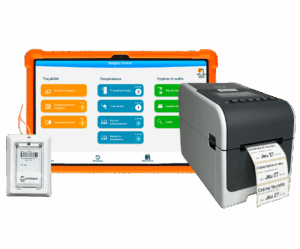HACCP certification: how do I get it?
Summary
- The path to HACCP certification: a complete guide
- What is HACCP certification and why is it important?
- Key steps to HACCP certification
- Choosing the right food hygiene training for HACCP certification
- Practical tips for successful HACCP certification
- After HACCP certification: maintaining and applying standards
The Path to HACCP Certification: Complete Guide
The path to HACCP certification for foodservice applies to commercial, traditional, collective, fast food, takeaway, and cafeteria catering activities. It is subject to a set of regulations aimed at ensuring food safety for consumers. Find out how to obtain HACCP certification.
Among these rules is the obligation of HACCP training and the requirement that each establishment must have at least one staff member certified in HACCP. What is this HACCP certificate and how can you obtain it? Find out in this article.
What is the HACCP Certificate and Why is it Important?
HACCP training complies with the requirements of Article 5 of Regulation (EC) No 852/2004. It requires food business operators to implement, apply, and maintain procedures based on the HACCP principles—a risk analysis and management method for food handling. The HACCP certificate is issued to food professionals who successfully complete the mandatory HACCP training.
The HACCP certificate is important for two reasons. First, it confirms your ability to apply HACCP principles to ensure food safety and prevent foodborne illness outbreaks (TIAC). Second, it satisfies the legal requirement that every food establishment must have at least one person trained in food hygiene adapted to the activity, such as:
- Traditional catering;
- Collective catering;
- Fast food or takeaway catering;
- Cafeterias;
- Other self-service outlets;
- Associations regularly preparing hot meals…
Key Steps to Obtain HACCP Certification
To obtain an HACCP certificate, it is necessary to complete the mandatory HACCP training with an approved professional training organization. The certificate is issued after a 14-hour course (typically over two days), during which participants learn to:
- Identify key regulatory principles related to commercial catering;
- Analyze hygiene-related risks in commercial catering;
- Apply hygiene principles and good practices in commercial catering.
During this training, learners also acquire knowledge about:
- Food and risks to consumers;
- Basics of EU and national food regulations;
- The sanitary control plan, including HACCP principles, verification measures (self-checks and records), and the relevant hygiene best practices guide (GBPH).
Choosing the Right Food Hygiene Training for HACCP Certification
Food hygiene training for commercial catering, which leads to the HACCP certificate, can be taken online or in-person. Choose a training provider registered with the regional prefecture. The provider must also be listed with the DRAAF (Regional Directorate for Food, Agriculture, and Forestry) or the DTAM (Territorial Directorate for Food and the Sea), and appear in the regional directory of accredited food hygiene training providers (ROFHYA). Lists are also available from professional unions (SNRTC, UMIH, SNRC, etc.).
You should also select a provider offering training specific to your sector of activity so you get relevant, practical information. Lastly, choose one offering personalized follow-up and course materials you can reuse to support your HACCP efforts with your staff.
Practical Tips to Succeed in HACCP Certification
To obtain HACCP certification, you need to properly prepare for the mandatory training. There are many online resources available to help you learn about food hygiene best practices and the HACCP method.
Octopus HACCP offers free online HACCP training to food professionals. These courses cover all HACCP topics, helping you understand the principles, learn the required procedures, and perform self-checks. Regularly taking these free online modules boosts your chances of earning your HACCP certificate.
After Receiving the HACCP Certificate: Apply and Maintain Standards
After receiving your HACCP certificate, it’s important to regularly update your hygiene practices to ensure daily food safety. This way, you can integrate new procedures, new ingredients, and new practices in risk management. These online trainings can also be used to raise awareness among your teams and encourage their commitment to the HACCP approach.
Find more information about HACCP standards in this article and explore our free training courses.



